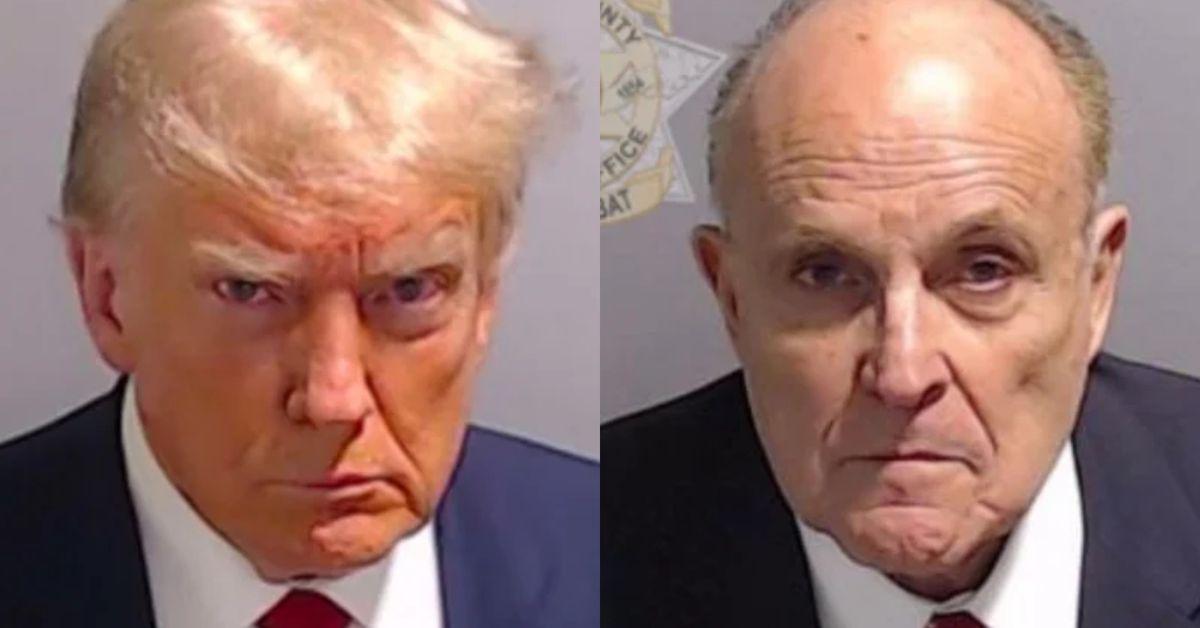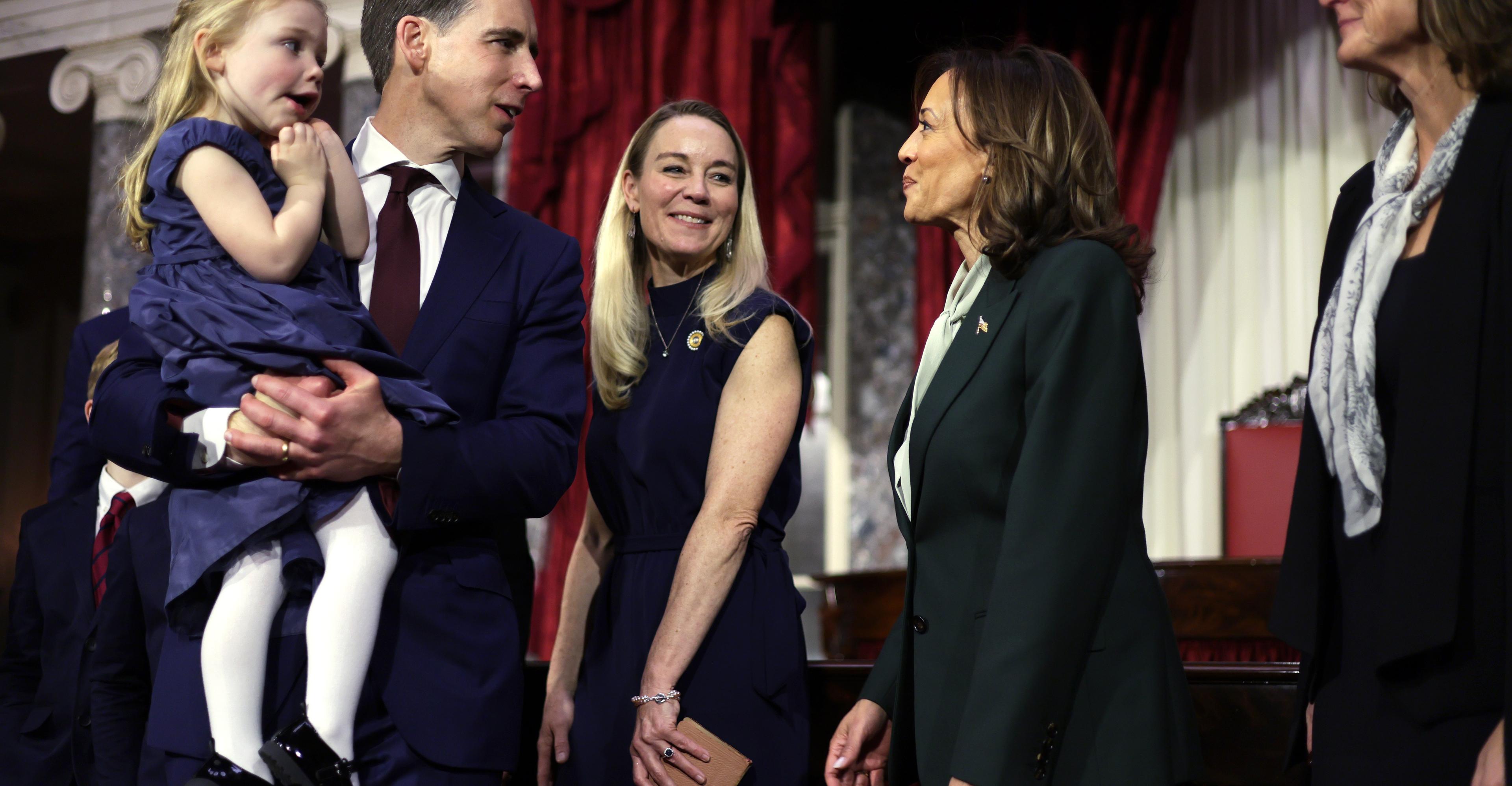The mugshots and the charges they face, briefly explained.


Former President Donald Trump was arrested August 24 in Fulton County, Georgia, on charges related to his attempts to overturn the 2020 election.
The Georgia charges come from the largest of the four serious criminal cases Trump faces; one of several unique things about Trump’s Georgia indictment is the number of defendants who are named in it. While the US government’s January 6 case against Trump largely focuses on the former president, Fulton County District Attorney Fani Willis is pursuing a case not only against Trump, but 18 additional defendants who were attorneys, staffers, and local officials allegedly working with the former president.
Willis charged such a large group because she argues that the Trump campaign was at the center of a criminal enterprise and that many of the individuals named in the case helped assist in the organization’s attempt to overturn the Georgia 2020 election results.
Establishing that Trump and his allies were part of an enterprise — a person, group, or business engaged in legal or illegal behavior — is key to Willis’s assertion that the defendants violated Georgia’s Racketeer Influenced and Corrupt Organizations (RICO) Act. To do so, prosecutors will need to convince a jury that all the defendants are guilty of racketeering, or organizing an enterprise to systematically plan and commit crimes, and using coercion, manipulation, and intimidation as needed to advance their goals.
The list of people Willis says were part of that enterprise is a lot to keep track of, and includes high-profile familiar faces — such as former Trump attorney Rudy Giuliani and former White House Chief of Staff Mark Meadows — as well as less-well-known individuals like false electors David Shafer and Shawn Still.
Below, we have a visual guide of the 19 defendants’ mugshots, the charges they face, and their connection to this indictment. (Some mugshots have yet to be released and will be added when they are. Defendants have until Friday, August 25, at noon to turn themselves in to Georgia officials.)
:no_upscale()/cdn.vox-cdn.com/uploads/chorus_asset/file/24873441/1621335357.jpg)
Former President Donald Trump
Role: Former president and charged as head of the criminal enterprise
Charges: 13, including racketeering, soliciting a public official to violate their oath of office, and making false statements
Connection to the case: The indictment describes Trump as the leader of the criminal enterprise that sought to overturn the 2020 Georgia election results.
Among other things, it accuses him of planning, alongside allies, of misleading the public about the election in speeches, repeatedly lying to elected officials in key states to get them to back his push to overturn the election, pressuring many officials to tamper with the electoral process, working to disrupt Congress’s certification of the electoral vote, and using social media to foment conspiracy theories.
It also claims that Trump knew he had not won the election and that the activities his allies undertook to overturn it were done with Trump’s implicit, and often explicit, approval.
Trump’s post-election legal team
:no_upscale()/cdn.vox-cdn.com/uploads/chorus_asset/file/24873449/1619649891.jpg)
Rudy Giuliani
Role: Former Trump attorney
Charges: 13, including racketeering, making false statements, and conspiracy to commit forgery
Connection to the case: Giuliani, formerly New York City’s mayor, became a close Trump ally over the course of the former president’s administration, and eventually served as Trump’s personal lawyer. He was a prominent figure in the days following the election, appearing on television and holding press conferences falsely arguing Trump won.
He is accused of pressuring legislatures in multiple states, including Georgia, to name electors that would award the election to Trump even though multiple recounts had confirmed his loss.
:no_upscale()/cdn.vox-cdn.com/uploads/chorus_asset/file/24873450/1632749696.jpg)
John Eastman
Role: Former Trump attorney
Charges: nine, including racketeering, solicitation of violation of oath by a public officer, and filing false documents
Connection to the case: Eastman is a longtime fixture in the conservative legal scene and was previously the chair of the Federalist Society. He began advising Trump in earnest following the 2020 election and composed a memo that was central to the former President’s efforts to pressure Vice President Mike Pence to reject the 2020 election results.
The indictment accuses Eastman of working with Trump to coordinate an alternative slate of electors in several states and of filing false documents that allege unfounded claims of election fraud in Georgia, including that thousands of felons and underaged people voted illegally.
:no_upscale()/cdn.vox-cdn.com/uploads/chorus_asset/file/24873453/1619649802.jpg)
Sidney Powell
Role: Former Trump attorney
Charges: seven, including racketeering, conspiracy to commit election fraud, and conspiracy to defraud the state
Connection to the case: Powell was a Trump campaign attorney who became one of the most visible faces of the effort touting unfounded election fraud claims, famously saying at one point that she would “release the Kraken” of evidence. Powell also vocally spread lies about how Dominion voting machines favored Biden versus Trump, an allegation that later played a role in the defamation lawsuit Dominion filed against Fox News.
The indictment accuses Powell of hiring a forensic data firm to acquire data from Dominion voting machines across the country, including in Coffee County, Georgia. It also alleges that Powell tampered with electronic ballot markers and machines in Coffee County.
:no_upscale()/cdn.vox-cdn.com/uploads/chorus_asset/file/24873465/1619648640.jpg)
Kenneth Chesebro
Role: Former Trump attorney
Charges: seven, including racketeering, conspiracy to commit forgery, and conspiracy to commit filing false documents
Connection to the case: Chesebro, a lawyer who has worked with conservatives in recent years, is one of the lesser-known Trump attorneys who played a major role in advancing the idea of the fake electors scheme. As part of his argument, Cheseboro suggested that multiple states could have false electors put forth votes for Trump and send them to Washington, sowing doubt around Biden’s win.
The indictment accuses him of several offenses, including conspiracy to commit filing false documents by submitting a document about the Georgia electors in court that contained false statements. His memos allegedly helped fuel the plan to secure a slate of alternative electors in each state that could be sent to Congress to cause confusion and distrust.
:no_upscale()/cdn.vox-cdn.com/uploads/chorus_asset/file/24873476/1619649699.jpg)
Jenna Ellis
Role: Former Trump attorney
Charges: two, including racketeering and solicitation of violation of oath by a public officer
Connection to the case: Ellis is a conservative lawyer and a former deputy district attorney from Colorado. Ellis allegedly coordinated Georgia hearings that helped perpetuate unfounded claims of election fraud and is said to have participated in meetings and hearings related to overturning the vote in other key states as well.
The indictment accuses her of writing memos making the legal case that a vice president can intercede during the congressional session meant to certify the electoral vote and can stop that vote from happening. These memos supposedly helped form the basis of the pressure campaign Trump publicly waged to try to get his vice president, Mike Pence, to help overturn the election.
:no_upscale()/cdn.vox-cdn.com/uploads/chorus_asset/file/24873451/GettyImages_1619648904.jpg)
Ray Smith
Role: Former Trump 2020 campaign attorney in Georgia
Charges: 12, including racketeering, solicitation of violation of oath by a public officer, and false statements
Connection to the case: Smith was previously a staffer in the Georgia Attorney General’s office and served as Trump’s local attorney in Georgia during the 2020 campaign. Smith is named for testifying at a Georgia state Senate hearing and perpetuating election lies there, as well as participating in an election challenge in Georgia state court. Additionally, he is accused of pressuring Georgia House members to appoint alternative electors.
Government and campaign officials
:no_upscale()/cdn.vox-cdn.com/uploads/chorus_asset/file/24873456/GettyImages_1620723958.jpg)
Mark Meadows
Role: former White House chief of staff
Charges: two, including racketeering and solicitation of violation of oath by a public officer
Connection to the case: Meadows was Trump’s fourth (if you count acting chief Mick Mulvaney) and final chief of staff and was a key member of his inner circle in the final days of his administration. In all of the January 6 investigations, there have been many questions about how much Meadows knew about Trump’s state of mind during his attempts to overturn the election.
The indictment mostly casts him as a facilitator, allegedly helping coordinate communications between Trump and Georgia election officials, coordinating legal strategies, and spreading false theories about election fraud.
:no_upscale()/cdn.vox-cdn.com/uploads/chorus_asset/file/24873464/GettyImages_1622942809.jpg)
Jeffrey Clark
Role: former acting assistant attorney general at the DOJ
Charges: two, including racketeering and attempt to commit false statements and writings
Connection to the case: Clark became known during the January 6 investigation as a DOJ official said to have tried to use the chaos unfolding at the end of the Trump administration to catapult himself into the role of acting attorney general, and then, to use the power of that office to force key states to acknowledge Trump’s false electors, handing the election to Trump.
The indictment details Clark’s communications with acting attorney general Jeffrey Rosen and other key officials, including a false letter intended for Georgia officials that suggested the DOJ had observed concerns with the state’s election results that could have required the reevaluation of the outcome and the appointment of new electors. It suggests that he was a key part of the effort to use the government as a tool to overturn the election.
:no_upscale()/cdn.vox-cdn.com/uploads/chorus_asset/file/24873475/GettyImages_1623095739.jpg)
Michael Roman
Role: Senior Trump campaign staffer
Charges: seven, including racketeering, conspiracy to commit impersonating a public officer, and conspiracy to commit forgery
Connection to the case: Roman had a low-profile role in the Trump campaign as its director of Election Day operations. That job required coordination with local election officials, lawmakers, and campaign members. The indictment suggests Roman used contacts made during the campaign to help coordinate the plan to set up a slate of fake electors and alleges that he provided organizational support for that plan in Georgia, including setting up meetings.
:no_upscale()/cdn.vox-cdn.com/uploads/chorus_asset/file/24873474/1622931899.jpg)
Misty Hampton
Role: Former Coffee County, Georgia, election supervisor
Charges: seven, including racketeering, conspiracy to commit election fraud, and conspiracy to defraud the state
Connection to the case: In the weeks after the election, Hampton publicly questioned the results of the election and advanced the conspiracy theory that there was something amiss with Dominion Voting Systems machines, including by posting a video popular among the right meant to show that the machines could easily be tampered with. She told the Washington Post she allowed businessman Scott Hall, one of the other defendants, and others access to the Coffee County elections office to help prove to the world “that this election was not done true and correct.”
The indictment accuses her of improperly accessing and sharing the Coffee County machine’s data and of aiding Trump supporters who were trying to get data.
Local operators and Trump supporters
:no_upscale()/cdn.vox-cdn.com/uploads/chorus_asset/file/24873466/1622931794.jpg)
Robert Cheeley
Role: trial attorney in Georgia
Charges: 10, including racketeering, conspiracy to commit impersonating a public officer, and conspiracy to commit false statements
Connection to the case: Cheeley is a local lawyer who represented Trump, a fake elector, and other GOP figures. He is best known for testifying at a Georgia legislative hearing making false allegations of miscounting and election fraud, including under oath.
:no_upscale()/cdn.vox-cdn.com/uploads/chorus_asset/file/24873463/1632749697.jpg)
Scott Hall
Role: Atlanta-based Trump supporter
Charges: seven, including racketeering, conspiracy to commit election fraud, and conspiracy to defraud the state
Connection to the case: Hall is a local bail bondsman and Trump supporter. Hampton told the Washington Post that he and others visited Coffee County’s election offices but that she wasn’t sure exactly how they spent their time there, telling the paper, “I’m not a babysitter.” The indictment alleges he illegally accessed data from a voting machine in Coffee County, Georgia.
:no_upscale()/cdn.vox-cdn.com/uploads/chorus_asset/file/24873458/1623095846.jpg)
Stephen Lee
Role: Illinois pastor and Trump supporter
Charges: five, including racketeering, attempting to influence witnesses, and conspiracy to commit solicitation of false statements and writings
Connection to the case: Before the 2020 election, Lee was a traveling pastor who specialized in ministering to law enforcement post-crisis. A Trump supporter, he went to the home of election worker Ruby Freeman, whom pro-Trump conspiracy theorists accused of helping to illegally swing the election for Biden.
When the police came to the house, Lee told them, “I’m a pastor and I’m also working with some folks who are trying to help Ruby out and also get to some truth of what’s going on.” He went on to connect with codefendant Harrison Floyd, asking for his assistance in talking to Freeman, reportedly believing that Freeman, a Black woman, would respond more positively to Floyd, a Black man.
Lee’s efforts, the indictment claims, constitute intimidation of Atlanta election officials and illegal influencing of witnesses.
:no_upscale()/cdn.vox-cdn.com/uploads/chorus_asset/file/24873454/1620723887.jpg)
Harrison Floyd
Role: former leader of Black Voters for Trump
Charges: three, including racketeering, conspiracy to commit to false writings, and conspiracy to influence witnesses
Connection to the case: Floyd had long been a Trump supporter but became involved with the other defendants after responding to a call from Lee. He then reportedly recruited defendant Trevian Kutti’s assistance in trying to talk to Ruby Freeman, the Atlanta election worker pro-Trump forces accused of fraud. The indictment claims he participated in an intimidation scheme.
:no_upscale()/cdn.vox-cdn.com/uploads/chorus_asset/file/24873452/1623095709.jpg)
Trevian Kutti
Role: Trump supporter and former publicist for celebrities like Kanye West
Charges: three, including racketeering, conspiracy to commit solicitation of false statements, and conspiracy to influence witnesses
Connection to the case: Kutti traveled from her base of operations in Chicago to Atlanta after speaking with Floyd. Once there, she reportedly went to Freeman’s home, told her she’d been sent by an unnamed “high-profile individual,” and gave Freeman an ultimatum: Confess to election crimes or go to jail. Freeman called the police and was ultimately told by the FBI to relocate for her own safety.
Kutti, like Floyd and Lee, is now accused of being involved in Freeman’s intimidation and of influencing a witness.
False electors
:no_upscale()/cdn.vox-cdn.com/uploads/chorus_asset/file/24873448/1619648883.jpg)
David Shafer
Role: Georgia false elector and former chair of the state’s Republican Party
Charges: eight, including racketeering, impersonating a public officer, and forgery
Connection to the case: Shafer allegedly helped coordinate the false elector scheme in the state and signed documents suggesting that he was one of 16 qualified electors declaring Trump’s victory. According to the indictment, he asked the fake electors to quietly gather at the Georgia state Capitol on December 14, 2020, to “avoid drawing attention to what we are doing.” He then signed a letter to Georgia Gov. Brian Kemp asking him to approve the fake slate of electors.
Shafer has asked that the case against him be moved to federal court and has tried to pin the blame for any wrongdoing on those with more power and influence: “Mr. Shafer and the other Republican Electors in the 2020 election acted at the direction of the incumbent President and other federal officials,” Shafer’s attorney wrote in the petition. Trump’s attorneys had argued to Shafer that assembling the fake electors was necessary for the former president to win Georgia’s electoral votes if he was able to win his court challenges to the results, and Shafer has provided evidence that he was closely coordinating with them.
:no_upscale()/cdn.vox-cdn.com/uploads/chorus_asset/file/24873445/1623095998.jpg)
Shawn Still
Role: false elector and Georgia state senator
Charges: seven, including racketeering, impersonating a public officer, and forgery
Connection to the case: Still, the secretary of the Georgia 2020 Electoral College Meeting, was among 16 Republicans who signed a certificate falsely claiming that they were “duly elected and qualified” electors for the state and that Trump had won the election. He then signed a letter to Georgia Gov. Brian Kemp asking him to approve the fake slate of electors.
He has also asked that the case against him be transferred to federal court because he was acting at the direction of Trump’s attorneys, whom he argues were effectively agents of the federal government at that point.
:no_upscale()/cdn.vox-cdn.com/uploads/chorus_asset/file/24873440/1619648841.jpg)
Cathy Latham
Role: false elector and former head of the Coffee County Republicans
Charges: eleven, including racketeering, impersonating a public officer, and forgery
Connection to the case: Latham was among 16 Republicans who signed a certificate falsely claiming that they were “duly elected and qualified” electors for the state and that Trump had won the election. Based on phone calls and text messages procured by Georgia prosecutors, she was also charged in connection to a voting system breach in Coffee County allegedly orchestrated by Hampton and other Trump allies who sought to provide evidence that the 2020 election was fraudulent.
The indictment alleges that Latham and others tampered with electronic ballot markers and tabulating machines and took official ballots outside of a polling location without authorization.

PM Shehbaz Sharif directs to digitize oil and gas supply chain
- a day ago

Petkit’s first automatic wet food feeder keeps track of how much your pet eats
- 15 hours ago
Amid MVP chatter, QB Stafford focused on finale
- 12 hours ago
49ers' Kittle (ankle) 'absolutely' expects to play
- 12 hours ago
U-19 Tri-Series: Pakistan thrash Afghanistan by 133 runs
- 8 hours ago

You can’t trust your eyes to tell you what’s real anymore, says the head of Instagram
- a day ago

The Dreame X40 Ultra robovac is about $700 off, nearly matching its best price
- 8 minutes ago
Adil Raja, Sabir Shakir, Wajahat Saeed, Moeed Pirzada get two life terms each in May 9 digital terrorism case
- 13 hours ago

Pakistan regards Taiwan as inalienable part of China: FO
- 13 hours ago

26 things we think will happen in 2026
- a day ago
Trump says US will ‘come to their rescue’ if Iran kills protesters
- 13 hours ago

PSX achieves another milestone, surpasses 179,000 points
- 13 hours ago






